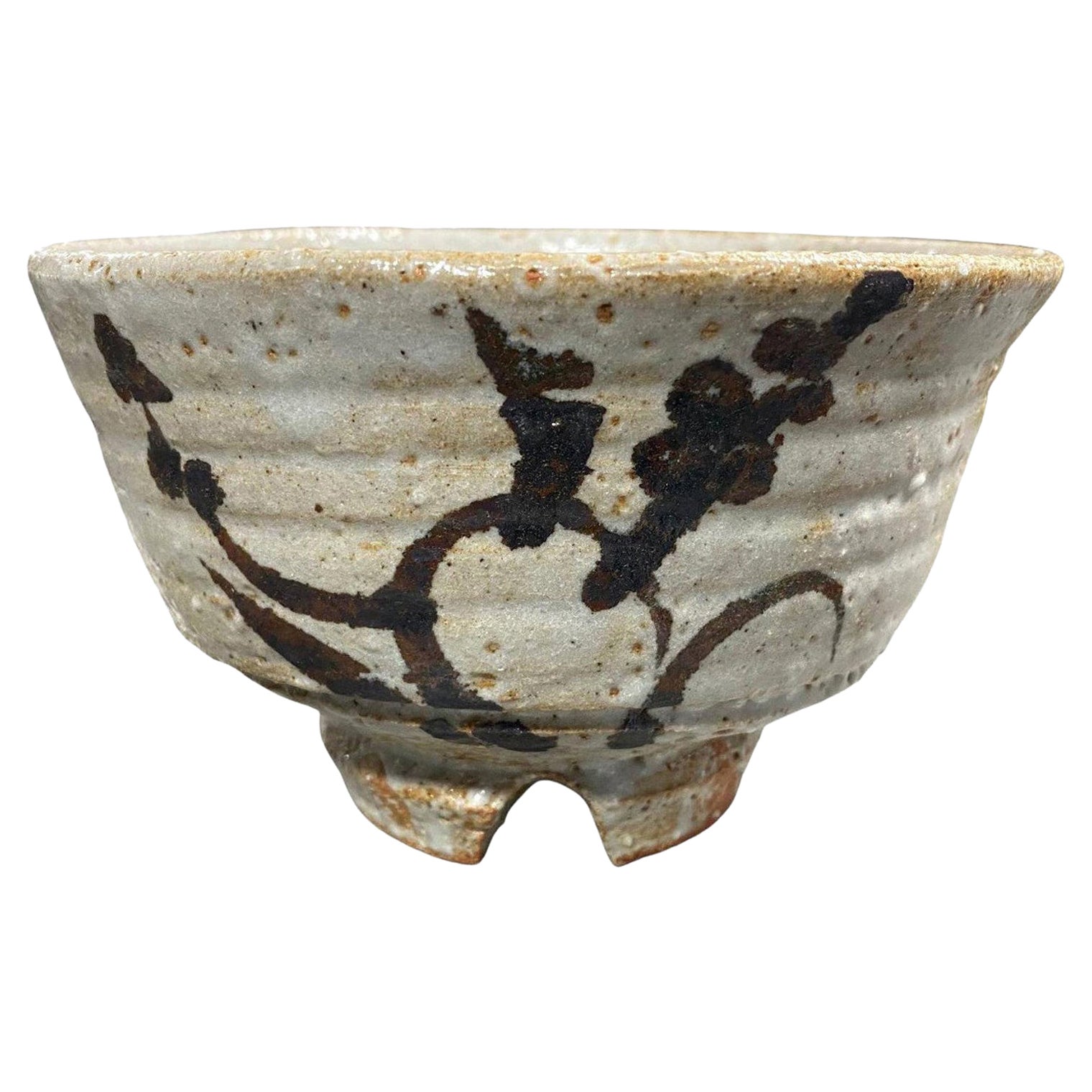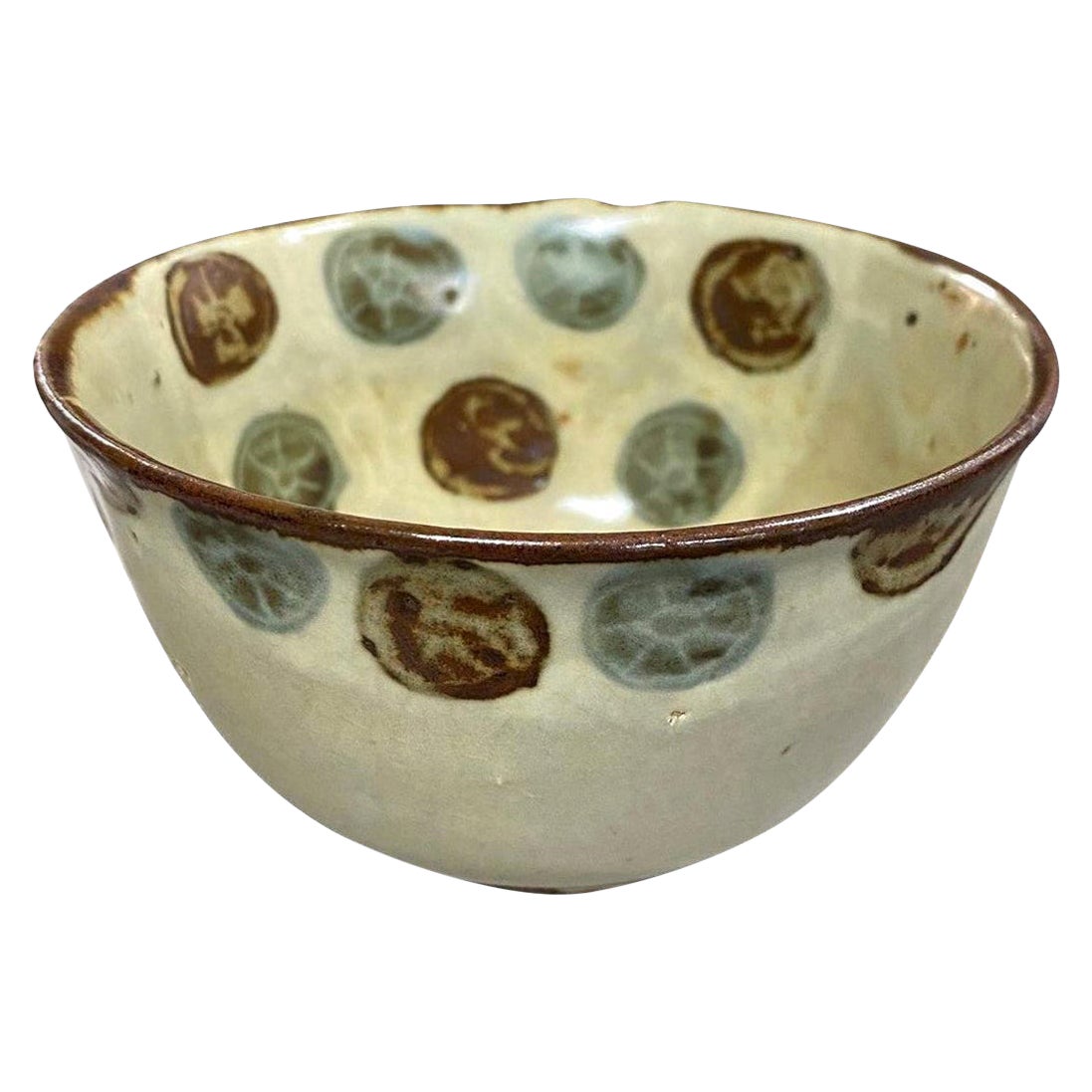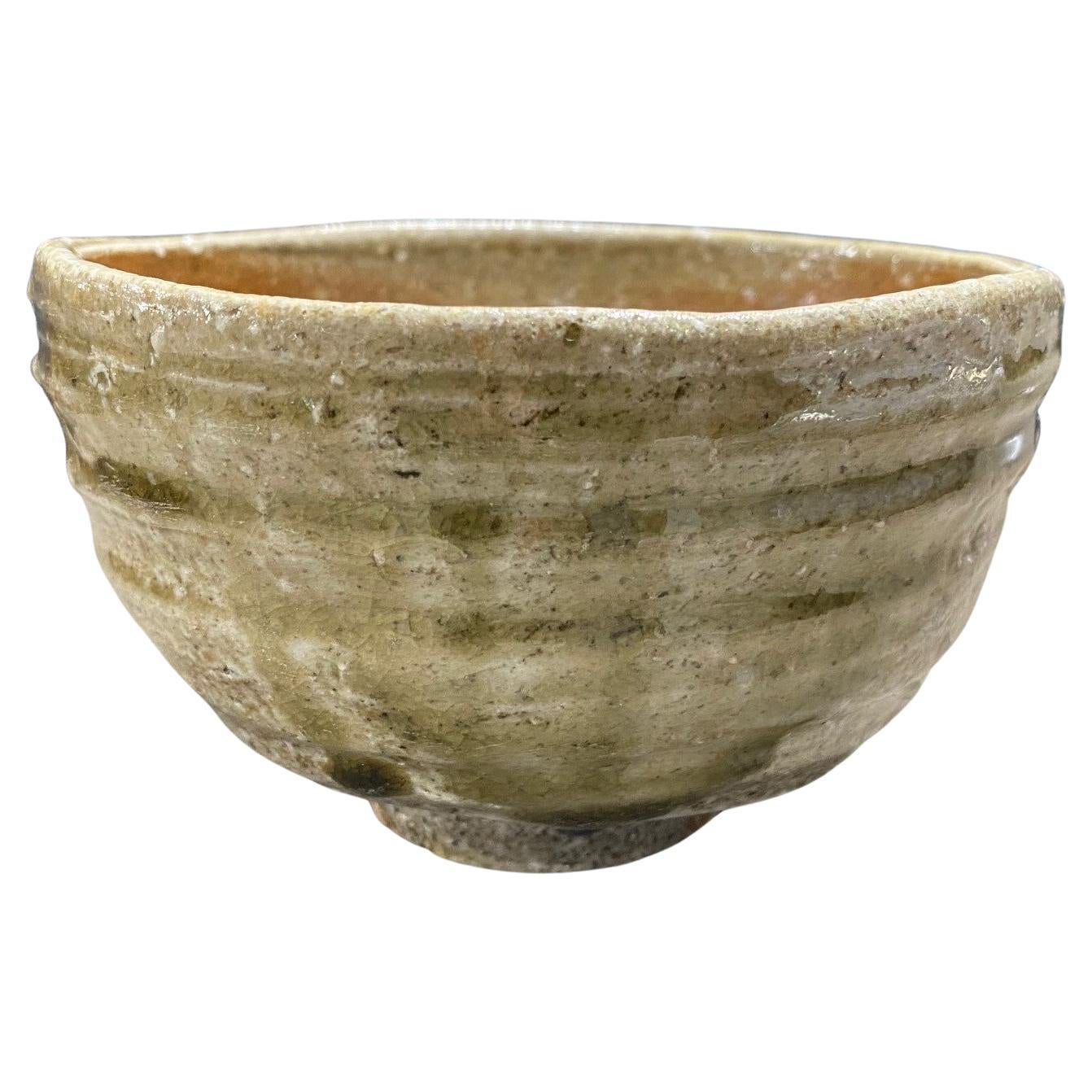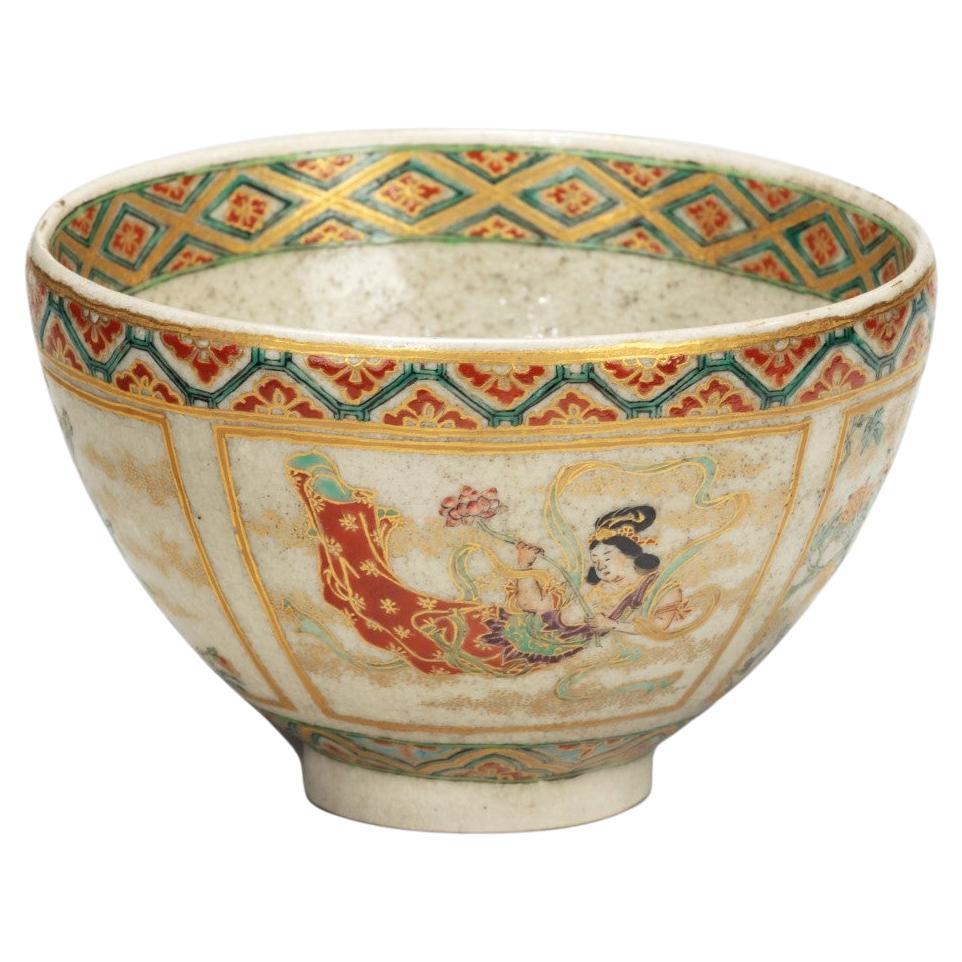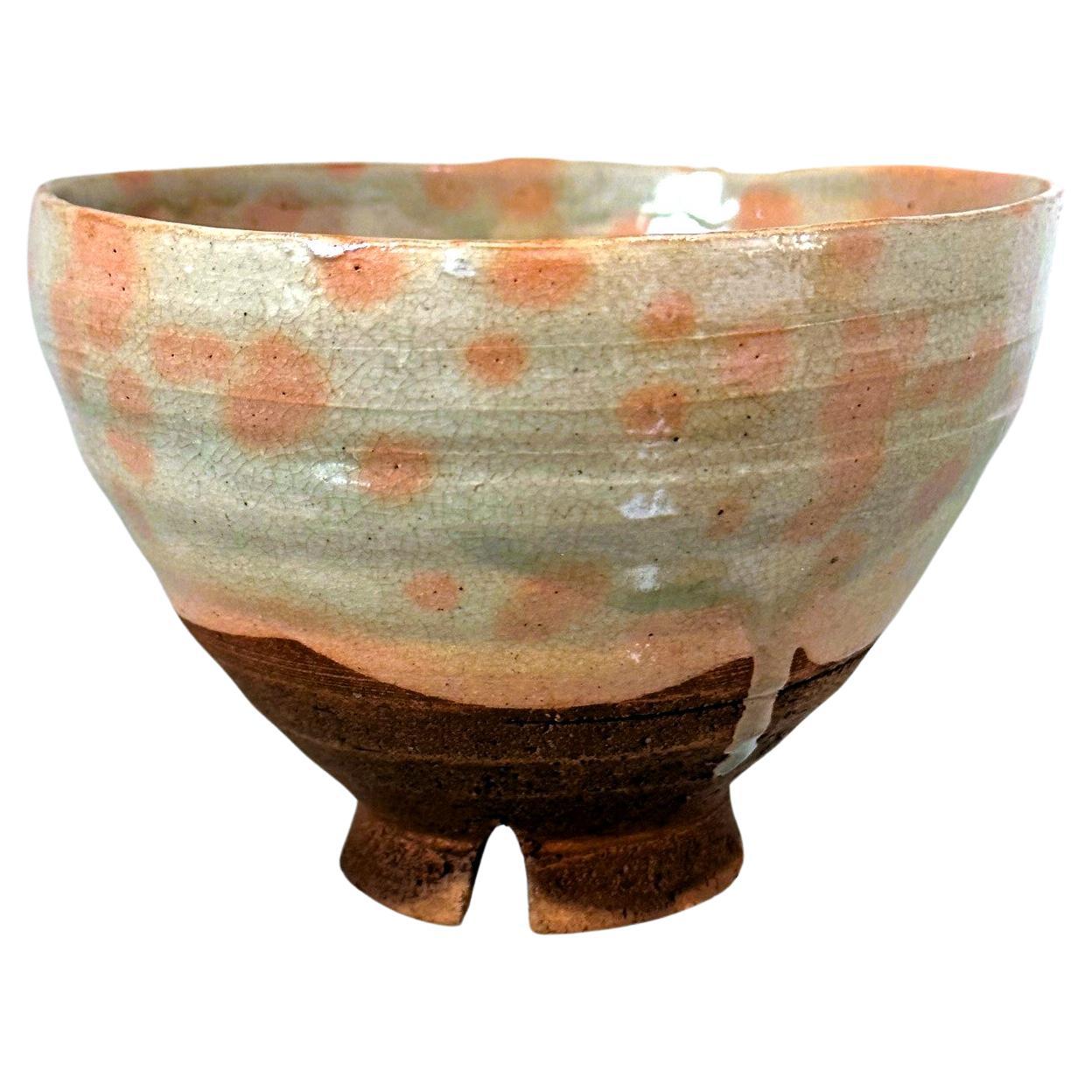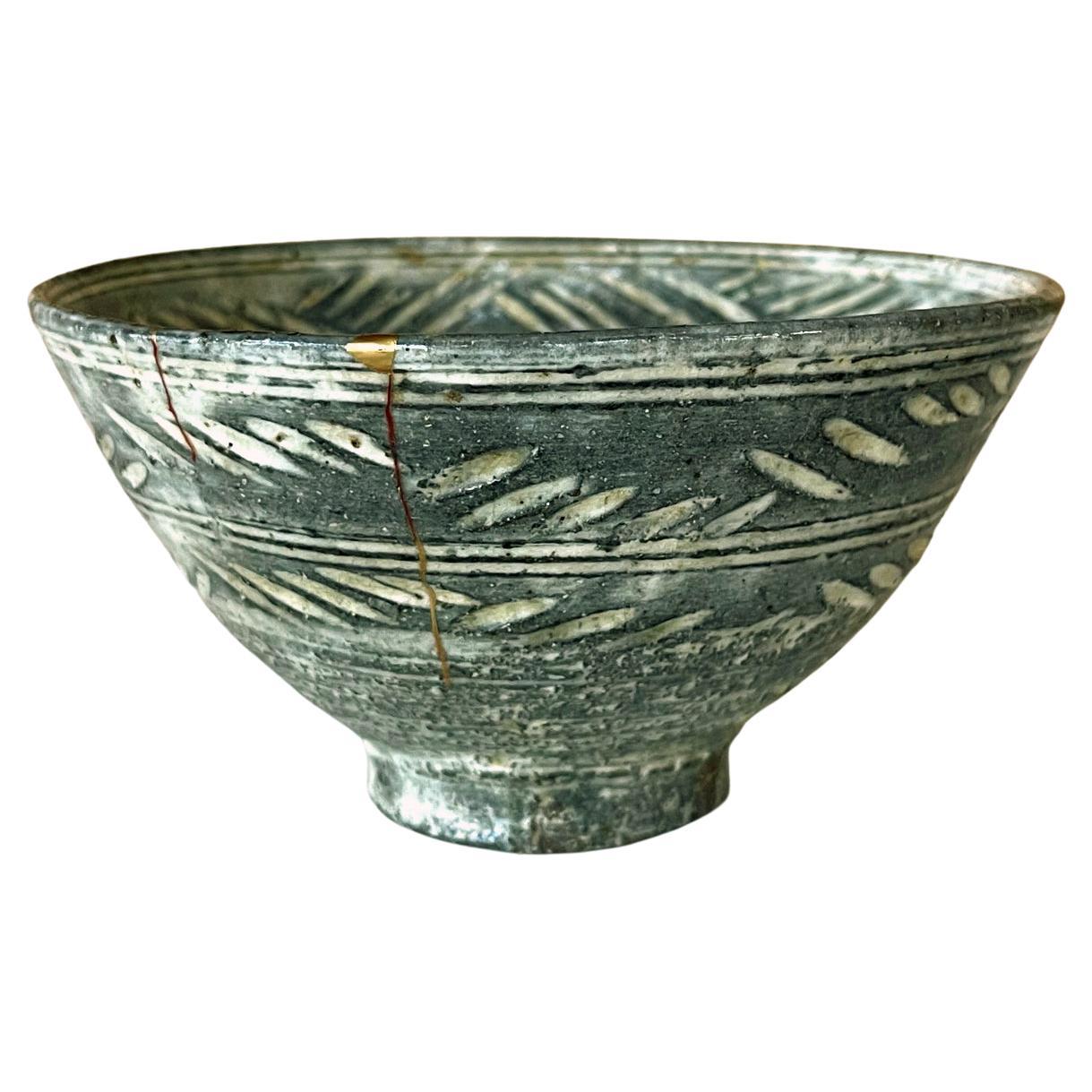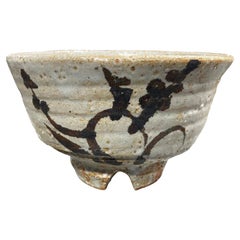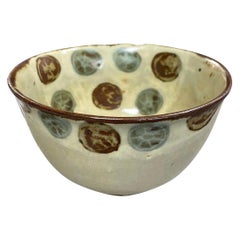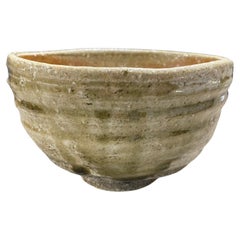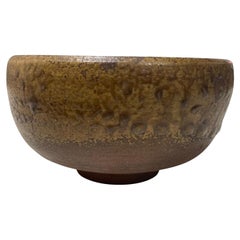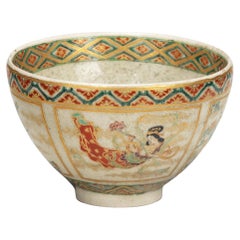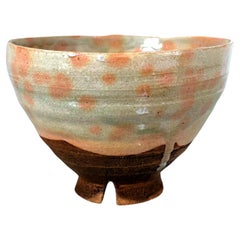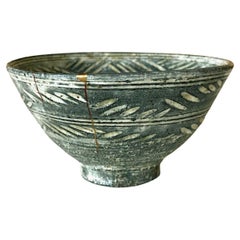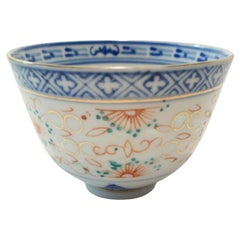Items Similar to Rosanjin Kitaoji Signed Painted Chawan Tea Bowl with Original Sealed Signed Box
Want more images or videos?
Request additional images or videos from the seller
1 of 21
Rosanjin Kitaoji Signed Painted Chawan Tea Bowl with Original Sealed Signed Box
$4,995
£3,790.09
€4,333.63
CA$6,976.66
A$7,757.10
CHF 4,050.33
MX$94,422.76
NOK 51,680.42
SEK 48,422.09
DKK 32,342.68
Shipping
Retrieving quote...The 1stDibs Promise:
Authenticity Guarantee,
Money-Back Guarantee,
24-Hour Cancellation
About the Item
An absolutely gorgeous hand-painted pottery Chawan tea bowl by Japanese master potter Kitaoji Rosanjin (1883-1959) who was arguably one of if not the greatest artists/ceramicists of the 20th century. Rosanjin (whose real name was Kitaoji Fusajiro. In 1922 he changed his name to Kitaoji Rosanjin which translates as “foolish mountain man”) was famed in Japan for many talents - calligrapher, ceramicist, engraver, painter, lacquer artist, and restaurateur.
It is noted that Rosanjin had one of the greatest ceramics collections in Japan in the early part of the 20th century but the Great Tokyo earthquake of 1923 destroyed most of his personal collection so he began making pottery himself to replace it. In 1926 he established his own kiln in the Yamasaki neighborhood of Kamakura. In 1946, after the war, he continued to make his ceramics and art while also opening a restaurant in the Ginza district of Tokyo which catered to upper-echelon Americans. In 1951, he invited sculptor/artist Isamu Noguchi and his wife Yoshiko Otaka the actress to live on his property in Kamakura, where they stayed for several years. In 1954, Rosanjin accepted an invitation from the Rockefeller Foundation to hold a solo exhibition of his works in New York City at the Museum of Modern Art. Afterward, he visited Europe, where he would meet with the esteemed artists Pablo Picasso and Marc Chagall. In 1955, one of his Oribe ware works was designated an Important Cultural Property of Japan by the Japanese government. A few years later in 1959, Rosanjin was designated a Living National Treasure by the Japanese government but was one of the very few nominated people to indignantly decline the honor (he did so twice). The rumor was that he felt insulted that the Japanese government had offered this status to a former studio assistant of his first, and this was how he chose to express his dissatisfaction.
The bowl features a unique colorful hand-painted decoration and has Rosanjin's incised signature on the base. The bowl comes with the original signed and sealed wood protective box that also has a written authentication of the work and signature of Kuroda Totoan ( also known as Kuroda Ryoji 1905-1987), Rosanjin's most famous and noted art appraiser.
A rare, beautiful, one-of-a-kind work. Would clearly be the crown jewel of any Japanese Asian ceramics/pottery or art collection. Rosanjin's work has become quite rare and scarce to find, especially in such impeccable condition with the original signed/sealed wood box and the written authentication by Kuroda Totoan. A coveted combination indeed.
Bowl dimensions: 3.25" high, 5.15 diameter
Box dimensions: 4.75" high, 6" wide, 6" deep.
- Creator:Rosanjin Kitaoji (Artist)
- Dimensions:Height: 4.75 in (12.07 cm)Width: 6 in (15.24 cm)Depth: 6 in (15.24 cm)
- Style:Showa (Of the Period)
- Materials and Techniques:
- Place of Origin:
- Period:
- Date of Manufacture:1940s-1950s
- Condition:In very good to excellent vintage condition with no discernable flaws, cracks, chips, etc... The box may have light, if any wear consistent with age and use to box only (please see photos). Spectacular and special overall.
- Seller Location:Studio City, CA
- Reference Number:1stDibs: LU2254334042402
About the Seller
5.0
Platinum Seller
Premium sellers with a 4.7+ rating and 24-hour response times
1stDibs seller since 2016
908 sales on 1stDibs
Typical response time: <1 hour
- ShippingRetrieving quote...Shipping from: Van Nuys, CA
- Return Policy
Authenticity Guarantee
In the unlikely event there’s an issue with an item’s authenticity, contact us within 1 year for a full refund. DetailsMoney-Back Guarantee
If your item is not as described, is damaged in transit, or does not arrive, contact us within 7 days for a full refund. Details24-Hour Cancellation
You have a 24-hour grace period in which to reconsider your purchase, with no questions asked.Vetted Professional Sellers
Our world-class sellers must adhere to strict standards for service and quality, maintaining the integrity of our listings.Price-Match Guarantee
If you find that a seller listed the same item for a lower price elsewhere, we’ll match it.Trusted Global Delivery
Our best-in-class carrier network provides specialized shipping options worldwide, including custom delivery.More From This Seller
View AllRosanjin Kitaoji Signed Shino Ware Chawan Tea Bowl Original Sealed Signed Box
By Rosanjin Kitaoji
Located in Studio City, CA
An absolutely gorgeous Shino ware pottery Chawan tea bowl by Japanese master potter Kitaoji Rosanjin (1883-1959) who was arguably one of if not the gr...
Category
Mid-20th Century Japanese Showa Ceramics
Materials
Ceramic
Ogata Kenzan Signed Japanese Asian Edo Period Pottery Tea Bowl Chawan
Located in Studio City, CA
A spectacularly designed and beautifully made Chawan tea bowl dating back to the Edo period. This work is attributed to Ogata Kenzan (1663-1743) who is wi...
Category
Antique 18th Century Japanese Edo Ceramics
Materials
Pottery
Rakusai Takahashi III Signed Japanese Shigaraki Pottery Chawan Tea Bowl with Box
By Takahashi Rakusai III
Located in Studio City, CA
A stunning Shigaraki ware pottery chawan tea bowl by famed Japanese master potter the 3rd Rakusai Takahashi. The bowl features a beautiful, unique natural organic ash glaze with wond...
Category
Mid-20th Century Japanese Showa Ceramics
Materials
Stoneware
Kaneshige Toyo National Treasure Signed Japanese Bizen Pottery Chawan Tea Bowl
Located in Studio City, CA
A beautiful, perfectly shaped antique Bizen ware Chawan tea bowl by renowned Japanese master potter/artist Kaneshige Toyo (1896-1967) featuring a unique natural, organic forming ash glaze. Kaneshige is universally considered to be the founder of modern Bizen pottery.
In 1956, Kaneshige was certified as a Living National Treasure (Important Intangible Cultural Heritage) for his work in Bizen Ware pottery/ceramics. Bizen Ware is a type of Japanese pottery traditionally from the Bizen province, presently a part of the Okayama prefecture. It is considered one of the Six Ancient Japanese Kilns (along with Echizen ware, Seto ware, Shigaraki ware, Tamba ware, and Tokoname ware).
The piece is signed/ sealed on the base with one of Kaneshige's traditional incised marks.
A rather engaging and scarce work. Would be a fantastic addition to any Japanese/Asian pottery or Bizen Ware collection or eye-catching stand-alone work in about any setting.
Kaneshige's work can be found in numerous prominent collections and museums including:
Aichi Prefectural Ceramic Museum, Seto, Japan
Brooklyn Museum, NY
Hagi Uragami Museum, Yamaguchi, Japan
Honolulu Art Museum, HI
Ibaraki Ceramic Art Museum, Kasama, Japan
Indiana Art...
Category
Mid-20th Century Japanese Showa Ceramics
Materials
Stoneware
Kichizaemon Raku Seinyu XIII "13th" Signed Antique Japanese Raku Chawan Tea Bowl
Located in Studio City, CA
A wonderfully glazed, impeccably made Chawan tea bowl by famed Japanese master potter the 13th Kichizaemon Raku, Seinyu (1887-1944) who was the eldest son of Konyu - the 12th Kichizaemon of the Raku family line of potters - known as the most noted and celebrated tradition of pottery within the world of Japanese tea. Kichizaemon Raku was the 13th master to carry on the family's esteemed name and tradition. The bowl features shifting textures and deep, rich colours which radiate in the light.
The term "Raku" was derived from the site where clay was dug in Kyoto in the late 16th century. The Kanji character for Raku translates to "enjoyment" or "fun/delightful" For 15 generations it has been the title and seal used by a lineage of potters whose work formed the central tradition in Japan. This lineage believes that 'Raku' refers to the potters who use the technique, not the technique itself. In the 16th century, the first of these potters, Chojiro is said to have come under the patronage of the Japanese tea master, Sen-No-Rikyu. According to legend, in 1598 a few years after Chojiro's death, ruler, Hideyoshi Toyotomi bestowed upon his adopted son, Jokei, a golden seal with the written symbol "Raku." Both the name and the ceramic style have been passed down through the family to the present ever since. The name and the style of ware have become influential in both Japanese culture and literature. Raku ware marked an important point in the historical development of Japanese ceramics, as it was the first ware to use a seal mark and the first to focus on close collaboration between potter and patron. Other famous Japanese clay artists...
Category
Early 20th Century Japanese Meiji Ceramics
Materials
Ceramic
8 Piece Japanese Kutani Hand Painted Chawan Tea Bowl & Cover Set in Original Box
By Kutani Studio
Located in Studio City, CA
A lovely set of 8 Kutani tea serving bowls with covers in an original stamped wood box.
All bowls signed/marked on the base.
Likely from the Showa pe...
Category
Early 20th Century Japanese Showa Tea Sets
Materials
Porcelain
You May Also Like
Small Satsuma Earthenware Tea Bowl
Located in Lymington, Hampshire
A small Satsuma earthenware tea bowl, the speckled greyish body decorated with four panels of alternating bijinand flowers, painted in overglaze en...
Category
Antique Early 1900s Japanese Ceramics
Materials
Ceramic
Japanese Glazed Ceramic Gohon Chawan Tea Bowl
Located in Atlanta, GA
A bespoken Japanese ceramic glazed tea bowl with fabric insert, pouch and original padded wood tomobako box. The chawan has a slightly irregular wall supported by a high notched foot...
Category
Antique 19th Century Japanese Meiji Ceramics
Materials
Ceramic
Antique Korean Mishma Tea Bowl Chawan Joseon Dynasty
Located in Atlanta, GA
A Korean Hori-Mishima Chawan (tea bowl) circa 16th-17th century (Joseon Dynasty). The tea bowl is of an upright conical form supported by a high foot ring. It was decorated with incised brushwood fence patterns filled with white slip on both the interior and exterior surface. These dominant motifs were spaced by three encircling double lines. Seven chrysanthemum flowers (inka) were stamped on the lower interior surrounding a swirling tea well on the bottom. There are six spur marks known as Meato in Japanese on the interior bottom and a pointy spot in the center of the foot ring known as Tokin. Two crack lines were historically repaired by superb Kintsugi, adding a mysterious wabi-sabi appeal to the piece.
The Hori-Mishima bowl was also known as Gohon Mishima. It was made in Bushan Kilns of the Southern Gyeongsang Province specifically for the Japanese market in the 16th-17th century, when the tea ceremonies in Japan demanded such ware. The bowl comes with a purple fabric pouch...
Category
Antique 17th Century Korean Other Ceramics
Materials
Ceramic
Vintage Grain of Rice Hand Painted Porcelain Tea Bowl - China - Mid 20th Century
Located in Chatham, ON
Vintage decorative Chinese grain-of-rice porcelain tea bowl - featuring hand-painted and gilded decoration - signed on the base - China - mid 20th century.
Excellent condition - no...
Category
Mid-20th Century Chinese Chinese Export Ceramics
Materials
Porcelain
Japanese Shino Chawan Tea Bowl Edo Period
Located in Atlanta, GA
A Japanese ceramic Chawan (tea bowl) of e-Shino (painted Shino) ware style circa mid-late 18th century Edo period. The classically shaped bowl features an abstract blue paint of blue grass and displays strong characters in the milky white glaze, with overall crawling and crackling effect. One of the most distinctive characteristics of Shino that is exemplified on this bowl is the small pinholes called suana, which tea masters favor (termed as yuzuhada, or citron skin). The milky-white feldspar...
Category
Antique Late 18th Century Edo Ceramics
Materials
Ceramic
Chinese Jian Ware Style Signed Haresfur Pottery Teabowl with Gilded Rim
Located in Bishop's Stortford, Hertfordshire
A very impressive and stylish Chinese haresfur glazed pottery tea bowl in the Jian Ware style, signed to the base, and believe to date from the 20th century....
Category
20th Century Chinese Chinese Export Ceramics
Materials
Metal
More Ways To Browse
Original Asian Art
Vintage Seals
Vintage Painted Bowl
Signed Artist Bowl
Used Restaurant Signs
Seal Box
Japanese Bowl Signed
Signed Wood Bowl
European Ware
Japan Tea Box
1950s Noguchi
Noguchi Signed
Japanese Wood Bowl
Early American Painted Boxes
Japanese Chawan
Vintage Japanese Lacquer Box
Retro Treasure Craft Pottery
Jewel Tea
